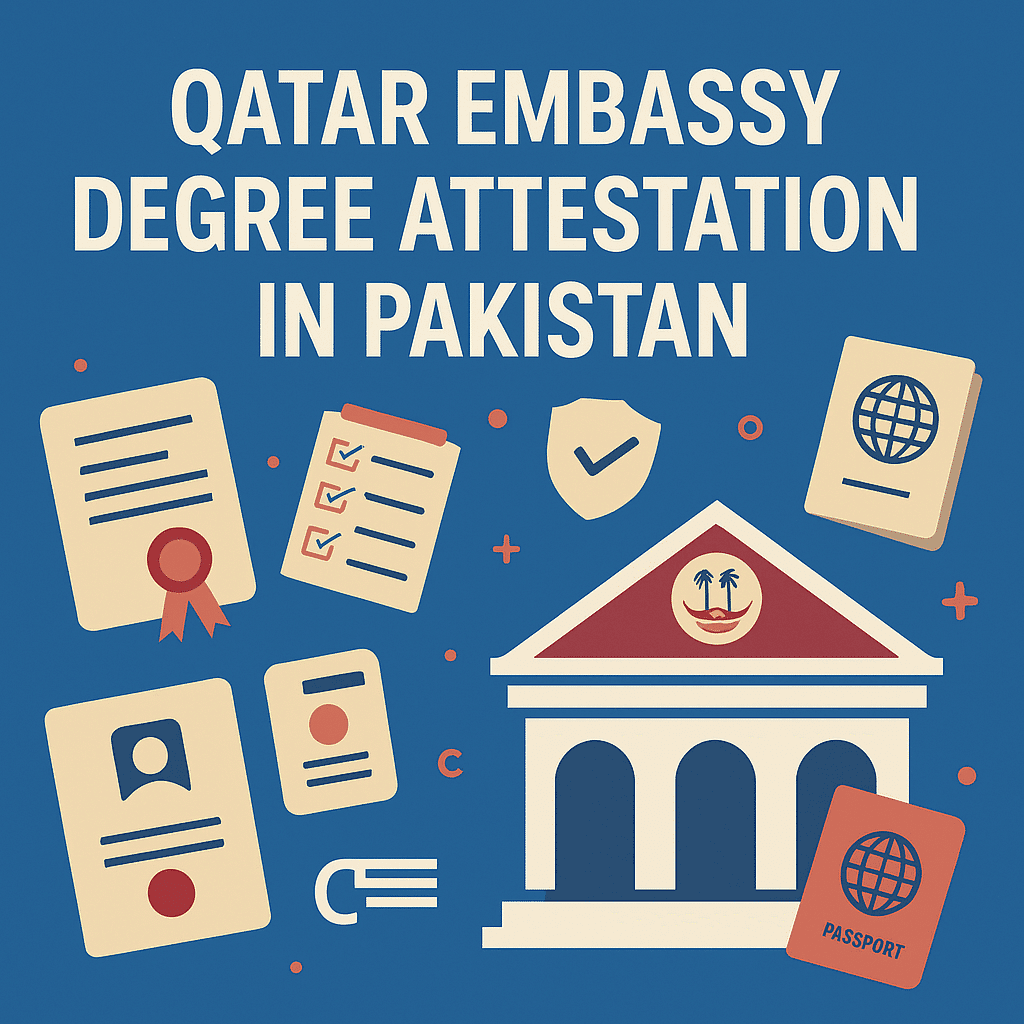
Qatar Embassy Degree Attestation in Pakistan – Step-by-Step 2025 Guide
Planning to work or study in Qatar? Then attesting your degree from the Qatar Embassy in Pakistan is essential. This guide offers a comprehensive, updated process for 2025—covering all required steps, documents, timelines, and professional tips that go beyond what typical agency pages share.
✅ What Is Qatar Embassy Degree Attestation?
Qatar Embassy attestation is the final stamp of authenticity your educational (or other) documents need to be accepted in Qatar. It confirms that your Pakistani-issued degree is verified and trusted by both your home country and the Qatari government.
The process involves three main stages:
Verification by relevant Pakistani authority (e.g., HEC, IBCC)
Attestation from the Ministry of Foreign Affairs (MOFA) Pakistan
Final attestation by the Qatar Embassy in Islamabad
Documents Eligible for Attestation
Educational Documents:
Matric and Intermediate certificates
Bachelor’s, Master’s, and PhD degrees
Transcripts / Mark Sheets
Personal / Civil Documents:
Birth Certificate
Marriage Certificate
Family Registration Certificate (FRC)
Legal / Commercial Documents:
Power of Attorney
Company Documents
Experience Letters
Educational documents must be verified by HEC or IBCC before proceeding.
Step-by-Step Attestation Process (Updated for 2025)
Step 1: Local Authority Verification
Degrees issued by Pakistani universities must first be verified by HEC (for higher education).
Matric/FSc certificates require IBCC verification.
Civil documents should be issued or notarized properly (e.g., by NADRA or a registered notary).
Step 2: MOFA Attestation
Once verified, your documents must be authenticated by the Ministry of Foreign Affairs in Pakistan. You can book an appointment via the MOFA online portal and submit your documents at their regional offices.
Step 3: Qatar Embassy Attestation
After MOFA attestation, your documents are eligible for final legalization by the Qatar Embassy in Islamabad. You’ll need to prepare:
Original document
Photocopy of each document
Valid passport copy
CNIC copy
Embassy attestation request form
Make sure all spellings on your documents match exactly—this is a common reason for rejection.
⏳ Average Processing Time
| Step | Estimated Time |
|---|---|
| HEC/IBCC Verification | 2–5 working days |
| MOFA Attestation | 1–2 working days |
| Qatar Embassy Attestation | 2–5 working days |
Note: Timelines may vary based on document type, holidays, and embassy workload.
Expert Tips for a Smooth Attestation Process
Spellings must match – Ensure your name on the degree, passport, and CNIC are identical.
Avoid laminated documents – Embassies may reject laminated papers.
Staple documents only – Don’t glue anything together.
Keep extra photocopies – You may be asked for duplicates at any step.
Use a transparent folder – Makes the review process faster and easier at embassy counters.
Track courier submissions – If you’re applying through a service or remotely, ask for tracking.
Frequently Asked Questions (FAQs)
Q1: Is MOFA attestation mandatory before Qatar Embassy attestation?
Yes, without MOFA attestation, the Qatar Embassy will not accept your documents.
Q2: Can someone else submit my documents on my behalf?
Yes, but the person must carry an authority letter signed by you, along with their CNIC.
Q3: Do I need translation of my degree?
If your documents are in Urdu or bilingual, a certified Arabic translation may be required. English degrees are generally accepted without translation.
Q4: Is there any deadline or expiry for an attested degree?
No. Once a degree is attested by the Qatar Embassy, it remains valid indefinitely unless the document itself has an expiry (like a police clearance certificate).
Checklist Before Submission
✅ HEC/IBCC verified original document
✅ MOFA attested original
✅ Passport copy (photo & visa page)
✅ CNIC copy
✅ Embassy attestation form (filled)
✅ Photocopies of all documents
✅ Folder to keep documents secure
Why Choose a Professional Attestation Agency?
Though the attestation process can be completed independently, professional agencies often help:
Save time by handling all stages (HEC, MOFA, Embassy)
Reduce mistakes that can cause rejections
Provide tracking and confirmation updates
When choosing an agency, make sure it is registered and transparent about its process.
